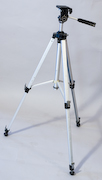
Digital Camera
Pros
- Light Weight
- Cost Effective
- Discreet
- Publish w/ No Editing
Cons
- Lower Picture Quality
- No External Mic
- Editing Potentially Complex

DV Camcorder
Pros
- Higher Picture Quality
- External Mic Input
- Manual Controls
- 1 Tape = 1 Hour
Cons
- Often Bulky
- Must Capture Footage
- Must Edit to Publish
Should you use a Digital Camera?
The digital camera is tiny, agile, and can be kept handy at all times. It is non-intrusive and great for doing interviews. In fact, you can quickly and easily publish digital camera footage without editing it.
However, there are two main caveats:
1.) Various models record in different formats, and some of these formats are not readily useable in Windows Movie Maker (see Incompatible Video Formats).
2.) Certain cameras have time limits for video recording — you'll want to make sure the camera you use doesn't have this issue.
Do you need a DV Camcorder?
DV camcorders generally give a much higher level of control over both picture and sound quality. A DV camcorder is usually physically larger, requires footage to be digitized (whereas digital cameras record files that can be dragged and dropped), and accessories add to the bulk (tapes, microphones, larger batteries, etc.).
Despite these disadvantages, if you need the improved image and sound quality, the tradeoff is worth your while. Camcorders are great for any project that needs to look crisp on a fullscreen computer, TV, projector, or DVD.

Tripod
Tripods are great for doing fixed shots, they can make video shot on an inexpensive camcorder appear more professional. If you want to move the camera (panning side to side or tilting up and down), you'll want a tripod with a fluid head — this will keep your movements from jittering. You can find consumer grade fluid-head tripods for under $100.
For details, see Tripods
We're always looking to improve these guides.
What is this page missing?


